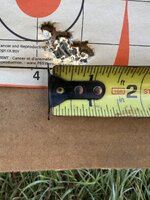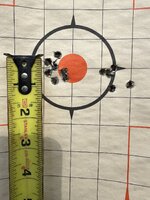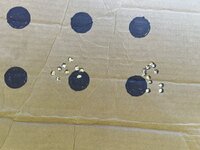Now to come at this from a different angle.
How much does any of this matter? Let’s say you’re shooting at a 10” target at 400yds. So 2.5MOA or roughly .7 mils.
how bad can your ES be and still be an impact?
With Berger ammo in 300PRC with a 215 going 2940, 4DOF says we should dial 1.4 mils to be on center of target. (Rough estimates) This means we have an elevation budget of .35 mils up or down and still impact the target. So how slow would it have to go to for our dope to be more than 1.7mils or how fast for our dope to be less than 1.1mils?
Fast: 1.1mils at 3175fps
Baseline: 1.4mils at 2940fps
Slow: 1.7mils at 2725fps
ES: 450fps
Wow that’s a pretty huge swing and yet it would still potentially hit your target. Now of course this is a huge swing that we wouldn’t really see in real life. Just trying to illustrate that the actual numbers can be way skewed and still hit. The real difference usually comes down to whether or not the shooter is capable of consistently shooting something like a 2.5MOA target at 400yds. So even though we all want tight numbers and groups for our reloading or factory ammo, it really doesn’t always effect our on target ability as much as we might think. We see guys miss targets at 400yds every weekend and most of them have single digit SDs. Load the best ammo you can, worry less, shoot more.
Good luck





